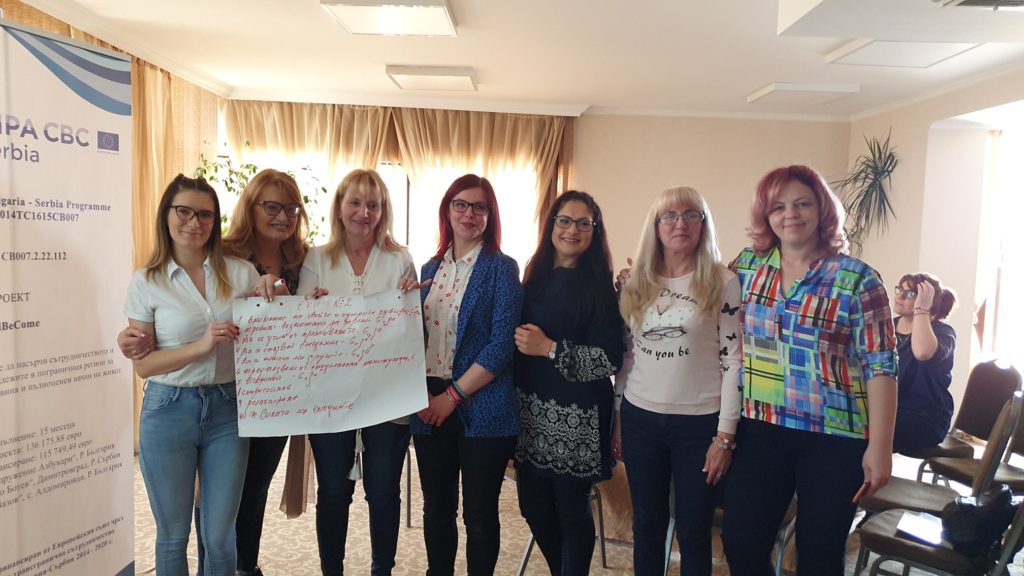The partners from schools on both sides of the border will work closely together with a common goal - a better and healthier life for young people.
An innovative educational project brought together pedagogues from Bulgaria and Serbia for a four-day training in the conference hall of the Festa Hotel in Sofia. The aim was to train 20 trainers under the WellBeCome project, as part of the Interreg-IPA Cross-Border Cooperation Program Bulgaria - Serbia 2014-2020. It is carried out by the non-governmental organization "Association of Alphabets" and was developed jointly with leading specialists from Sofia University "St. Kliment Ohridski ”.
Partners in the WellBeCome program are Ivan Vazov School in the village of Aldomirovtsi, Slivnitsa Municipality, Bulgaria and Hristo Botev School in Dimitrovgrad, Serbia. The aim of the training was to train 20 people (10 each from Bulgaria and Serbia), selected through an organized campaign, how to teach the concept of "WellBeCome" to students and other trainers.

The focus of the training was to create the appropriate knowledge, skills and critical thinking tools needed to teach children and young people how to live a life of well-being that combines a healthy body and mind, creating the necessary eating culture and harmonious perception of the world.
The same problems are observed on both sides of the border, the partners found: lack of culture in young people how to live a healthy, active and valuable life; lack of educational programs for the development of habits and skills to live a healthy, active and happy life; underdeveloped infrastructure for practicing extracurricular welfare initiatives; insufficient extracurricular initiatives engaging young people to live active lives.
Aware of this worrying situation, the project partners joined forces and began working together, which provided a "means of protection" for the aforementioned "youth disease". The project started by creating the necessary resources and environment for the development of the "WellBeCome" concept among young people in the field of cross-border cooperation. The concept embodies the concepts of "Do well" through life as "well-being" and "welcoming" peers join the network.
Prof. Dr. Vessela Gyurova: "The WellBeCome project is important not only for both countries, but is evaluated at the level of the European Union"

The WellBeCome project is important not only for both schools and both countries, but is also valued at European Union level. This was said at the beginning of her class by Prof. Dr. Vessela Gyurova from the Faculty of Science, Education and Arts of Sofia University "St. Kliment Ohridski ”and head of the research team. The European Union unites everyone around universal values through the competencies of our schools.
"I want to start with something that is important not only for me as a person, but also for our children and grandchildren, as we want to see them in the future. We all want to see how our Ministry of Education is ready to respond to our projects as an educational policy. I was very encouraged to include sustainable development in several educational programs and textbooks.
Objectives of sustainable implementation with priority of the WellBeCome project
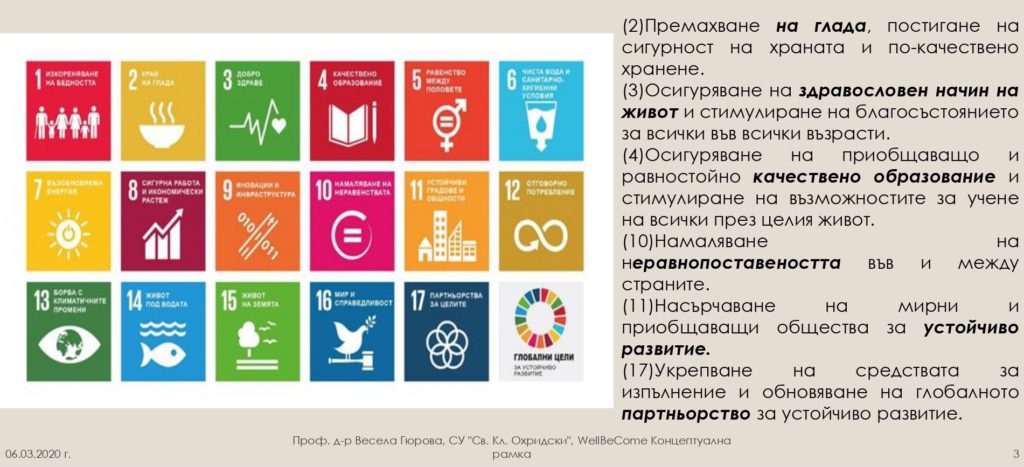
It turned out that the words "sustainable development" are of little concern to the ministry at the management level. They said they could include sustainable development in programs and standards, but they could not ensure it. This project is important precisely because it is one of the ways to achieve this sustainable development, "said Prof. Gyurova.
Our goals are related not only to our two countries, Bulgaria and Serbia, which live in friendship and good neighborliness, but also to Europe and the whole world, which wants to experience a more positive XXI century. To a large extent, this will be prepared by education, because education is culture. We build this culture every day in our educational institutions.
Our social meeting is also very important for creating sustainability within the project. From an ecological point of view, this is related to our daily behavior, our attitude towards healthy eating, active sports and pure nature.
We want sustainable development to be a priority not only in our educational institutions, but all over the world. That is why our project is subordinated to one global goal - sustainable development, said Prof. Gyurova.
Among the sub-goals of sustainable development, she highlighted the elimination of hunger, food security and better nutrition. Healthy living and the promotion of the well-being of all - both children and their parents - are also important. Therefore, the project, in addition to local, cross-border, has to do with the general perspective in education.
It is known that mutual trust, political will and flexible approach between stakeholders at different levels - from local to national, including civil society, in this case represented by a partnership of educational institutions (Sofia University "St. Kliment Ohridski") and NGOs ("Alphabets") - are vital for overcoming challenges and permanent obstacles in education, said Prof. Gyurova. That is why the WellBeCome project team aims to implement important functions.
He emphasized the benefits of cohesion policy for border regions, based on the goals of the active personal and social presence of adolescents. It stimulates the promotion of their competencies in the protection of health and the health regime, of education in sustainable development for the construction of attitudes towards consumption in the satisfaction of physical and spiritual needs.


The team will be guided by the focus on the positive importance of education and culture, and in particular the opportunities to accelerate efforts to promote cultural dialogue in border institutions in Bulgaria and Serbia. It will help to support extracurricular activities and activities of interest, according to the potential of schools and local authorities in these efforts. Educators will be encouraged to teach in the languages of neighboring countries in their curricula for primary, lower secondary and first secondary secondary education.
During the training for trainers, the team will be involved in activities to facilitate and rather promote mutual recognition and better understanding of specific interactive and multimedia skills in the curricula for extracurricular activities and activities of interest. Opportunities for cross-border learning mobility will be enhanced through equipped future "virtual classrooms", including the acquisition of skills in the current objectives of civic, health and environmental education.
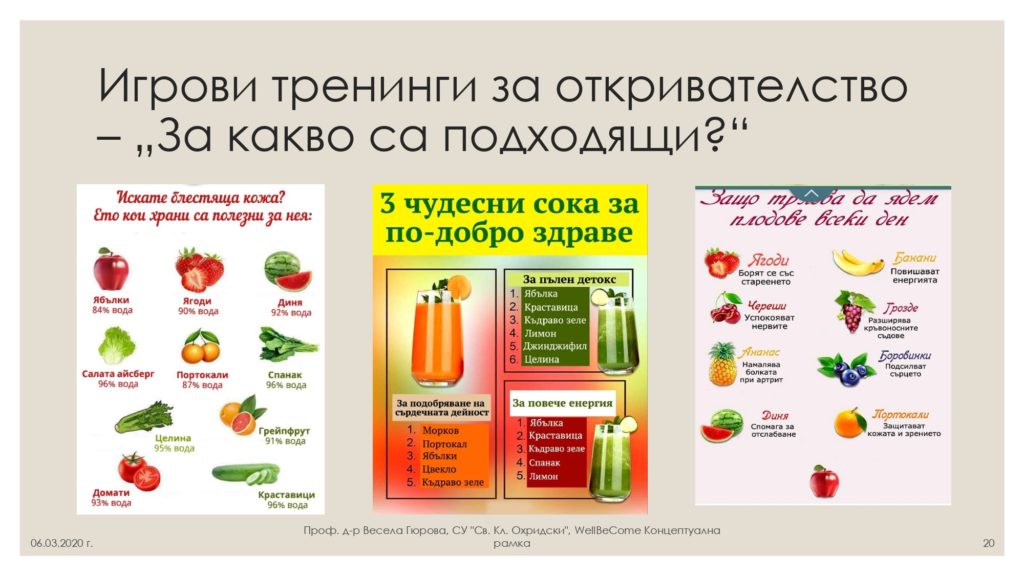
The aim of the project is to create interoperability of existing educational policies for the use of electronic and technological support systems at the local educational level. Establish interoperability of school electronic systems and take measures to facilitate access, including with language tools, to potential users from neighboring areas. Cross-border educational initiatives will be stimulated to increase efforts in relation to e-based education projects, which will have a positive impact on life and activity in the border regions;
Assoc. Prof. Dr. Asya Assenova: Experience training through the WellBeCome project is an extremely powerful tool for impact

Health education is a priority in the process of change towards sustainable development. This is due to the global nature of health problems such as risky sexual behavior, eating disorders, an increase in the number of young people living with HIV, the widespread use of cigarettes, an increase in substance abuse, and so on. This was said to the pedagogues by Assoc. Prof. Dr. Asya Assenova from the Faculty of Biology at Sofia University “St. Kliment Ohridski ”. The deepening of these problems raises questions about their solution both at the national level and globally.
According to the definition of the World Health Organization, health, understood as the complete physical, mental and social well-being of man, and not merely the absence of disease or disability, is the task of both the family and society. The World Health Organization focuses on five key areas, among which the development of personal skills, knowledge and opportunities for health promotion occupies a central place.
Assoc. Prof. Assenova emphasized that health is a result not only of physical conditions, family environment, norms and traditions, but also of the specific behavior that is built under the influence of accumulated knowledge, skills and attitudes of important people.
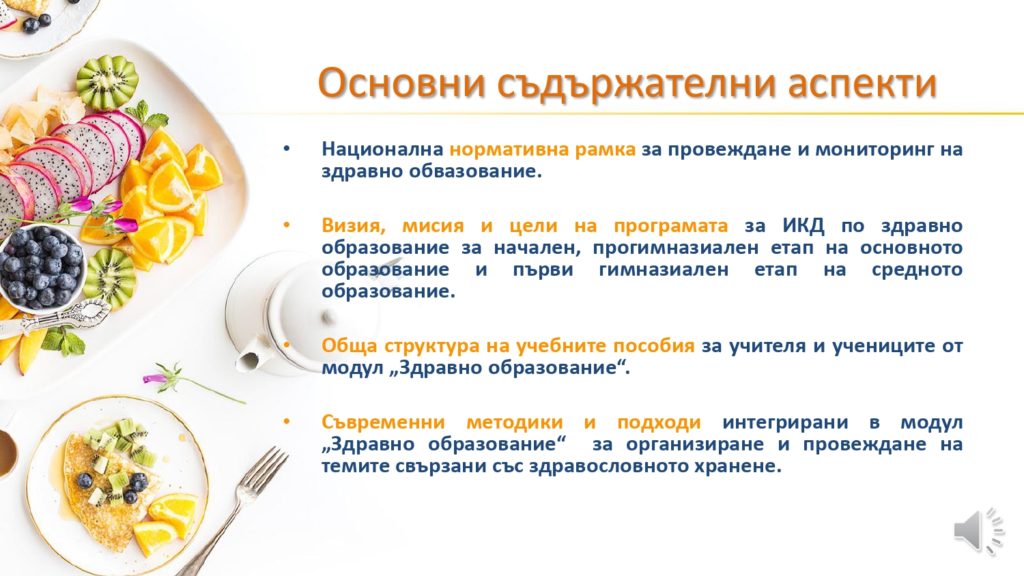
Today, teachers from all over the world are convinced that there is a need to focus on contemporary issues related to health education at all stages of education. The challenge is how to achieve maximum efficiency in this process. This requires the formation of competencies for assessment and decision-making, the formation of relationships and responsible behavior of young people, which can be effectively achieved by combining traditional with interactive teaching methods.
Solving cases and dilemmas, role-playing games, working in small groups, associative games, etc. are basic interactive methods that not only point out the problems, but require an active position and activity on the problems of health education. In this learning environment, all participants (students, teachers and parents) are learners, valuing important things, making choices, making responsible and difficult decisions, getting to know themselves, others and the world in a model analogous to reality.
The project is related to the integration of extracurricular activities of interest, with the preparation of appropriate thematic content in class and with training of age groups from primary and lower secondary stage of primary education and the first stage of secondary education.
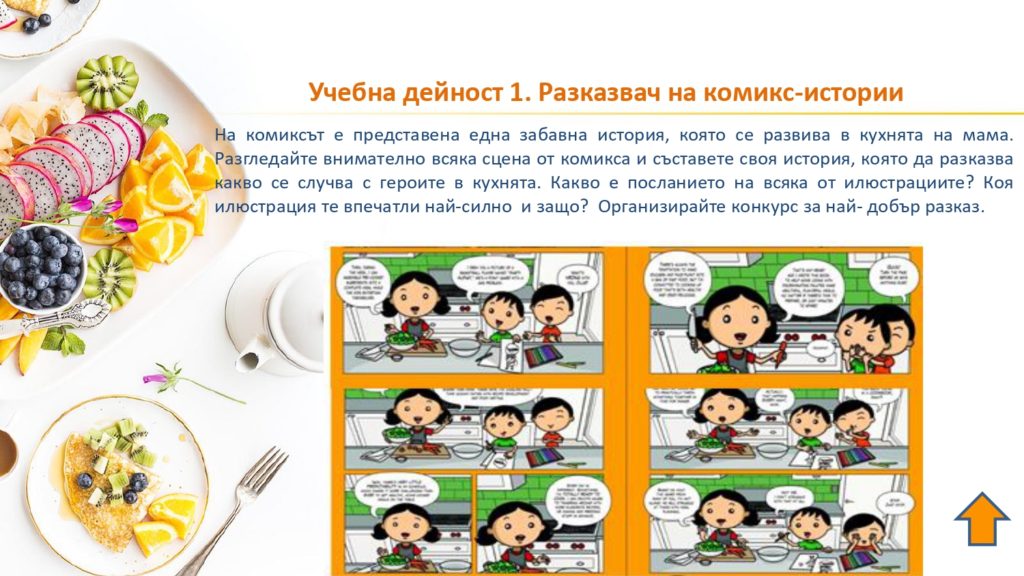
For the implementation of the program an integrative, interdisciplinary methodological framework (methodology) has been created for the formation and integration of specific knowledge and skills related to health education and specifically to a healthy lifestyle and nutrition.
A design of a complete learning process has been developed, subject to a certain methodology within the framework of freely elective preparation for the students from the primary stage, the lower secondary stage of the primary education and the first secondary stage of the secondary education.
The methodology is an author's development, based on the integrated game approach, project-based learning, drama learning and the introduction of new for our educational system teaching methods based on educational comics.
Ch. Assistant Professor Dr. Maria Valevicharska - Karaivanova: "Interpersonal relationships are extremely important in education"

The issue of interpersonal relations in school and society is equally relevant for all stages of schooling. This was said by Ch. Assistant Professor Maria Valevicharska - Karaivanova, PhD, from the Department of Special Pedagogy at the Faculty of Education Sciences, Sofia University “St. Kliment Ohridski ”.
The modern way of life, the changes in the fashion for communication, which cover mainly the online space, as well as the time for communication between a child and a parent are decisive for the type of relationships that children and young people build.

In this situation there is a place for the teacher, who through his professionalism, behavior and example, as well as through clearly purposeful activity, can have a positive impact and create very good practices for building positive interpersonal relationships and build acceptable personalities for the future. a social community in which they will participate anyway.
Interpersonal relationships are formed in the context of social, cultural and other influences and therefore the context may vary from family, kinship, friendship, work, education, religious practices or entertainment activities - sports, dance and more.

Interpersonal relations are regulated differently by law, by social norms and customs, by mutual agreements and are the basis of social groups and society as a whole. Interpersonal communication is an area that proves that people use verbal and nonverbal cues to achieve a number of personal relationships.
Interpersonal communication is often defined as communication that takes place between interdependent people who know each other: for example, a teacher and a student, classmates, two friends, and so on. Although interpersonal communication is most often between pairs of individuals, it can be expanded to include small intimate groups such as family, class, and friends. Interpersonal communication can take place face to face, as well as through platforms such as social media, which are very relevant in the 21st century.
Assoc. Prof. Ivaylo Prokopov: "Extracurricular sports initiatives are very important for a healthy lifestyle"

Extracurricular initiatives at school are an active and fruitful form for creating a culture of healthy and active lifestyle, well-being and a positive form of communication and communication. This was announced to the pedagogues by Assoc. Prof. Ivaylo Prokopov from the Department of Sports at Sofia University “St. Kliment Ohridski ”. The pedagogical process for motor activity of students is aimed at physical and mental improvement of adolescents.
The purpose of the pedagogical process and extracurricular forms of physical activity is to enrich the vocabulary and motor culture of children and students by including new movements and exercises.


Extracurricular forms of physical activity enrich children's vocabulary, learning new words, terminology and word combinations. The general culture in the field of physical education and sports is enriched by including new movements and exercises in order to improve motor skills and increase physical capacity.
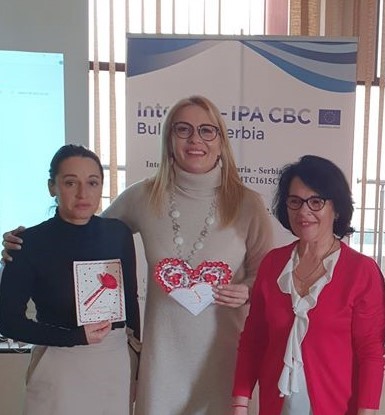
Extracurricular activities significantly improve the overall physical and functional development of students in primary education. Physical activity contributes to the development of intellectual qualities and ability to work, cognitive mental processes, moral and volitional forms of behavior and effort, aesthetic attitude to the activity, labor values and more.
Health education, as part of civic, environmental and intercultural education, develops skills for creating or maintaining a healthy lifestyle and living conditions and for voluntarily adapting to health-promoting behaviors.
A very important aspect is the improvement of physical capacity, health functional improvement, harmonious and complex personal formation. At each stage of training in a given sport, the goal is to achieve education for the sport and sports activity, a certain level of physical capacity and knowledge of a healthy lifestyle.
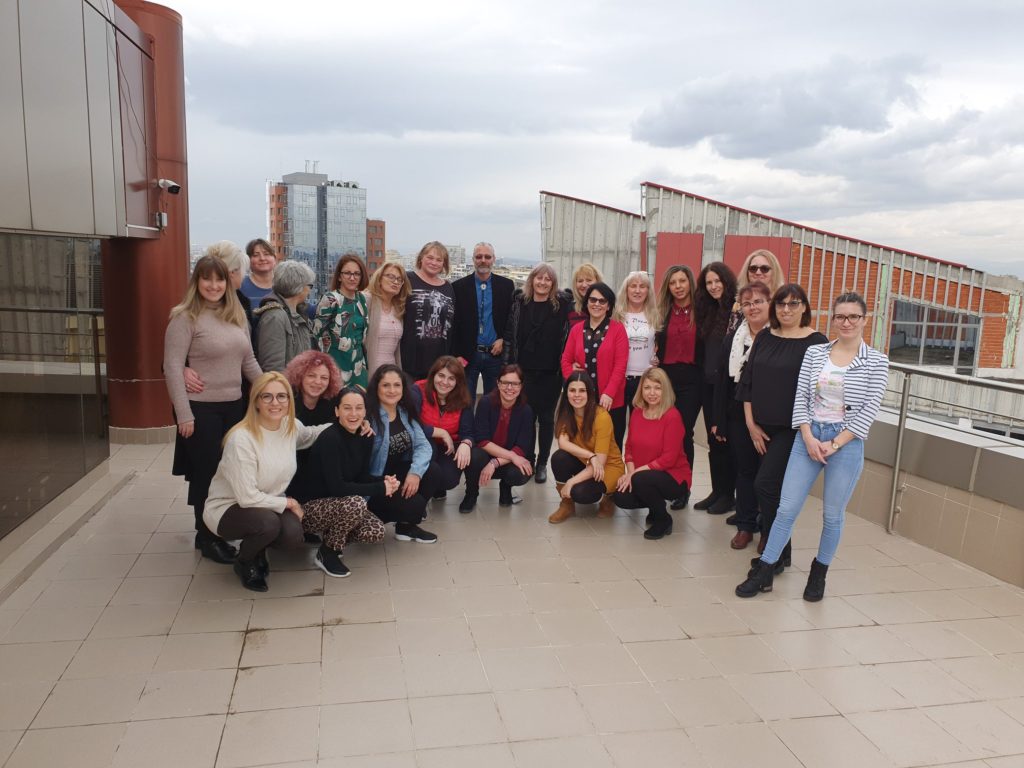
The meeting of trainers from both sides of the Bulgaria-Serbia border took place in a spirit of friendship and cooperation. The students praised the importance of innovative training. They shared that the knowledge and competencies they acquire will be useful not only as trainers in the "WellBeCome" program, but also in their overall pedagogical practice.




